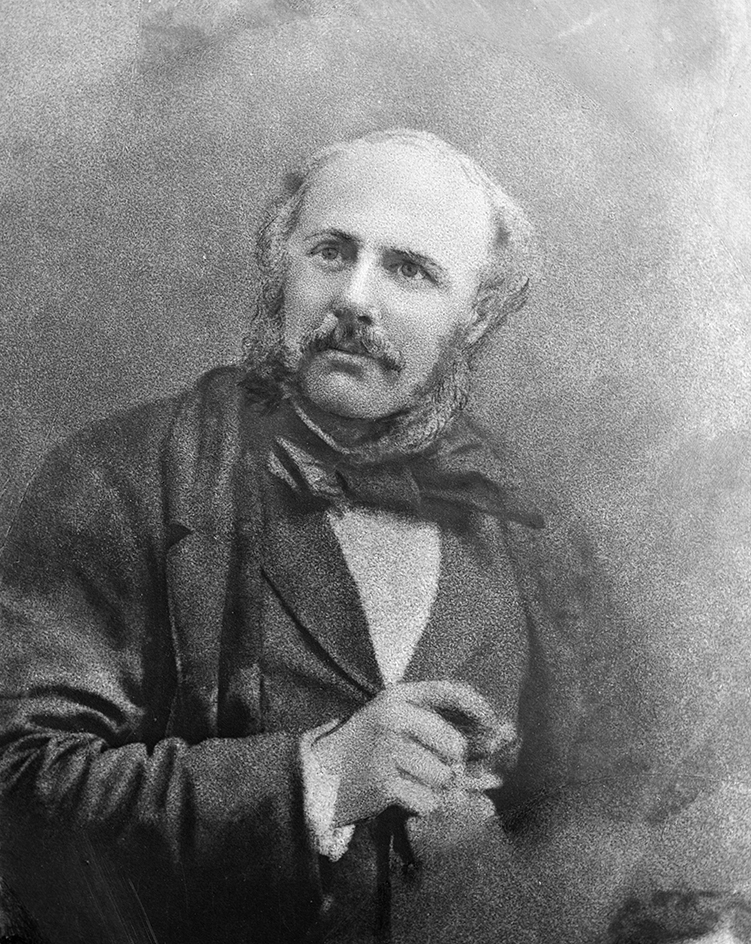Domett, Alfred (1811-1887), was premier, or prime minister, of New Zealand in 1862 and 1863. His government was in power during the New Zealand Wars (1860-1872). The wars were a series of conflicts between European colonists and New Zealand’s native Māori << MOW ree or MAH ree >> people. Domett also was a poet.
Early life and family

Childhood and move to New Zealand.
Domett was born in Camberwell (now part of London), England, probably on May 20, 1811. His parents were Nathaniel Domett, a shipowner, and Elizabeth Curling Domett. From 1829 to 1832, Alfred attended St. John’s College at Cambridge University. He did not graduate.
Domett’s first volume of poetry, Poems, was published in 1833. In 1835, he began studying law at the Middle Temple, one of London’s Inns of Court that served as the United Kingdom’s center for the study of the law. His second volume of poetry, Venice, was published in 1839. In 1841, Domett was called to the bar—that is, he became licensed to practice law. Domett sailed to Nelson, in New Zealand’s South Island, in 1842.
Wairau incident.
In 1843, European settlers and native Māori became engaged in a disagreement over land on the Wairau Plains near Nelson. The dispute led to a skirmish in mid-June that became known as the Wairau incident or the Wairau massacre. Settlers blamed the clash on local Māori and wanted them punished. Robert FitzRoy, who became the colonial governor in December, investigated the situation and determined that the settlers had been in the wrong.
Domett was among the settlers who had voiced their concerns about Māori to the colonial government. Domett, who by this time was writing for a local Nelson newspaper, criticized FitzRoy’s policies toward Māori.
Family.
On Nov. 3, 1856, Domett married Mary George, a schoolteacher who already had children from a previous marriage. Mary and Alfred had one son together, Alfred Nelson Domett.
Political career
In 1845, Governor FitzRoy nominated Domett to serve on New Zealand’s Legislative Council. The council was a body that mainly advised the colonial governor on policy and laws. However, Domett, who had become an outspoken critic of FitzRoy, turned down the nomination. In late 1845, George Grey replaced FitzRoy as New Zealand’s colonial governor. Grey had previously served as governor of the British colony of South Australia. After he took office in New Zealand, he acted firmly to end a Māori rebellion in northern New Zealand. In 1846, Grey persuaded Domett to join the Legislative Council. Domett later served as the colonial government’s civil secretary from 1851 to 1853.
Parliament.
In 1852, the British government granted New Zealand a constitution that established six provinces as well as a two-house Parliament. Domett served the new government in a number of roles in the following years. In 1855, he was elected to represent the town of Nelson in the House of Representatives. In 1856, he also served as commissioner of Crown lands (areas held in the name of the British monarch) for the province of Nelson. From 1857 to 1863, he served on the Nelson Provincial Council and was provincial secretary. In 1859, the growing town of Nelson officially became a city. In 1860, Domett was again elected to represent it in the House of Representatives.
Prime minister.
Continued land disputes between colonists and Māori led to the outbreak of war in 1860. In the years that followed, the New Zealand Wars became the central issue in New Zealand politics. In 1862, Prime Minister William Fox lost support in Parliament over his proposal to transfer the main control of Māori affairs from the British government to the government of New Zealand. This policy was controversial because the United Kingdom wanted the colonists to take over the main financial responsibility for Māori affairs if they were given control. Most colonists believed they needed the United Kingdom’s financial and military help. Grey then asked Domett to form a ministry. Domett became prime minister on August 6. While prime minister, Domett also served as secretary for Crown lands.
Domett supported the British government’s continued direction of New Zealand’s policies toward Māori. He also felt that rather than try to educate and “civilize” Māori, New Zealand should actively seek to conquer them. His positions caused conflict between members of his own government. Domett resigned his prime ministership following the resignation of several of his key ministers. He left office on Oct. 30, 1863.
Later political career.
Domett remained politically active for several years. In January 1864, Domett was appointed secretary for Crown lands, a paid civil service position previously held by a government minister. In 1865, he was appointed registrar-general of lands. In 1866, he joined the Legislative Council, which had become the upper house of Parliament under the 1852 Constitution.
Domett was well regarded as a land administrator. New Zealand’s colonial government in 1870 passed a law forbidding members of Parliament from holding paid Crown offices. However, Domett’s work as secretary for Crown lands was regarded so highly that he was specifically allowed to keep his paid positions as a land administrator while serving on the Legislative Council. Domett retired from politics in 1871.
Retirement and later life
After retiring, Domett returned to England and focused on poetry. In 1872, an epic poem on which he had long worked, titled Ranolf and Amohia, was published. The poem tells of the romance between a white sailor and a Māori princess. A short volume of Domett’s poetry was published in 1877. A revised edition of Ranolf and Amohia was published in 1883.
In 1880, Domett was appointed a companion of the Order of St. Michael and St. George, an award given in honor of service to the British Crown. Domett died in London on Nov. 2, 1887.
See also New Zealand, History of (The New Zealand Wars (1860-1872)); Wairau incident.
